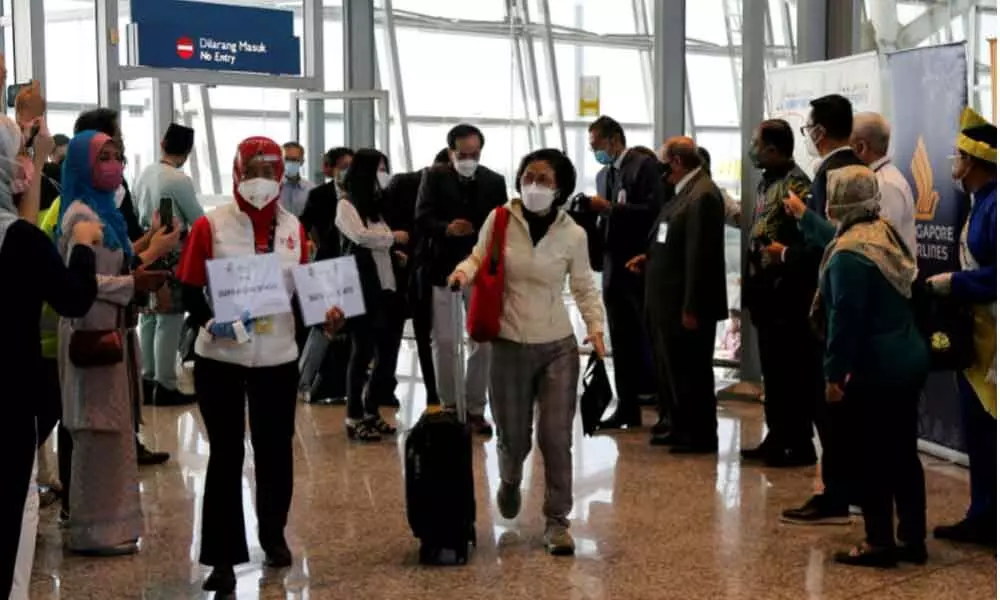Omicron could put spokes in travel industry's recovery
Looking at restrictions employed in the past year, travel bans will continue to have a negative impact on travel and tourism activity
image for illustrative purpose

Tourism and travel industries have been once again disrupted by the discovery of the newest Covid-19 Omicron variant. With uncertainty running high, some political decision-makers implemented travel restrictions such as the red-listing of Southern African countries, while scientists are working tirelessly to understand what we do and don't know about Omicron and how to navigate it.
All variants of Covid-19 can cause severe disease or death, in particular for the most vulnerable people - prevention is always the key. The risk of health system getting overwhelmed particularly demonstrates this.
As WHO Director-General Tedros Adhanom Ghebreyesus points out: "I need to be very clear: vaccines alone will not get any country out of this crisis. It's not vaccines instead of masks, distancing, ventilation or hand hygiene. Do it all. Do it consistently. Do it well."
The most effective steps individuals can take to reduce the spread of the Covid-19 is to maintain a 6 feet (2 meters) distance from others; wear a mask; avoid poorly ventilated or crowded spaces; keep windows open to increase ventilation when possible; wash hands; cough or sneeze into a bent elbow or tissue; avoid touching your face; and get vaccinated when it's available.
Looking at restrictions employed in the past year, travel bans will continue to have a negative impact on travel and tourism activity. The uncertainty of ever-changing travel bans has a measurable impact on demand. This is less due to lack of desire of travellers who may otherwise travel regardless of the pandemic, but rather from routes being cancelled or fear of getting stranded.
The negative impact on the travel and tourism industries of economies that depend on it more heavily, such as those in Southern Africa, is likely to be disproportionate. Recent lifting of travel restrictions, such as those in the US, had started to reflect an uptick in air travel, boosting confidence from travellers and industry actors alike. Travel bans aren't particularly effective in protecting public health while balancing the need for ongoing economic development. Countries should rather take a risk-based approach.
"Travel restrictions may play a role in slightly reducing the spread of Covid-19 but place a heavy burden on lives and livelihoods," Dr Matshidiso Moeti, the WHO's regional director for Africa, said in a statement. "If restrictions are implemented, they should not be unnecessarily invasive or intrusive, and should be scientifically based, according to the International Health Regulations, which is a legally binding instrument of international law recognized by over 190 nations."
Air travel itself remains as safe as proven throughout the pandemic. But many countries still have testing and vaccination requirements in place to protect against Covid-19 transmission throughout the entire travel process.
Travel and tourism businesses will feel an ongoing impact on the industry: There have been multiple reports on travel restrictions due to the new Omicron Covid-19 variant, putting the travel and tourism industry at an immense disadvantage and damaging or shutting down operations of small- and medium-sized business in particular.
As for other businesses, as much as virtual has served the global economy for the last two years, there are tremendous benefits to in-person engagements. Businesses are eager to restart their corporate travel. At the same time the landscape is disjointed and there remains a lack of global harmonization. Efforts by the World Economic Forum and others continue in the hope of bringing greater certainty to this environment, in particular through the use of frameworks and digital tools.
The pandemic was already projected to cost the world's tourism sector a loss of $1.6 trillion in 2021, the UN tourism body said, an estimate it made shortly before the discovery of the omicron variant, which the World Health Organization warns poses a "very high" global risk.
Revenue from global tourism and arrivals rebounded this year to some extent from 2020, while remaining below 2019 levels before the pandemic battered the sector, the United Nations World Tourism Organization said in a report published this month. Last year, the direct economic loss in tourism was about $2.0 trillion.
The World Economic Forum is revising its travel and tourism competitiveness report to better account for identifying and mitigating risks from climate, health and socio-economic factors. The pandemic has in many ways amplified and highlighted the importance of sustainability and resilience for future competitiveness in travel and tourism.
Businesses with major corporate travel budgets should be applying similar thinking into their strategies, and serve as early adopters of more resilient and sustainable practices. Aviation and tourism continues to deliver benefits to global business and economies, but should be undertaken in a way that considers public health priorities, as well as climate imperatives.

